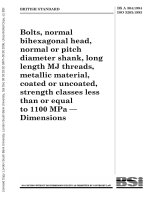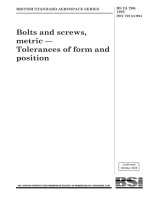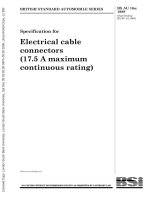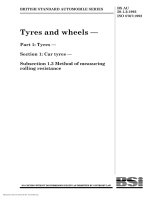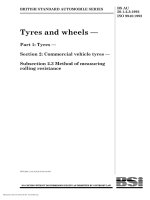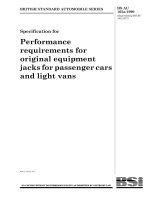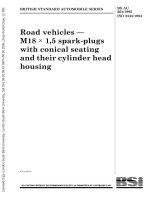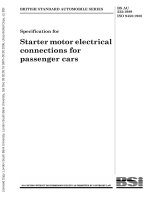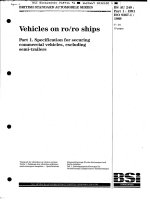Bsi bs 2a 231 1993 (1999) iso 3353 1992
Bạn đang xem bản rút gọn của tài liệu. Xem và tải ngay bản đầy đủ của tài liệu tại đây (872.68 KB, 14 trang )
BRITISH STANDARD
Rolled threads for
bolts —
Lead and runout
requirements
UDC 621.882.2:629.7
BS 2A 231:
1993
ISO 3353:1992
BS 2A 231:1993
Committees responsible for this
British Standard
The preparation of this British Standard was entrusted by the Aerospace
Standards Policy Committee (ACE/-) to Technical Committee ACE/12, upon
which the following bodies were represented:
The Association of Electronics, Telecommunications and Business Equipment
Industries
British Industrial Fasteners Federation
Ministry of Defence
Society of British Aerospace Companies Ltd.
This British Standard, having
been prepared under the direction
of the Aerospace Standards Policy
Committee, was published under
the authority of the Standards
Board and comes into effect on Amendments issued since publication
15 July 1993
© BSI 08-1999
The following BSI references
relate to the work on this
standard:
Committee reference ACE/12
Draft for comment 90/75077 DC
ISBN 0 580 21876 7
Amd. No.
Date
Comments
BS 2A 231:1993
Contents
Committees responsible
National foreword
1 Scope
2 Definitions
3 Symbols for threads
4 Lead and runout requirements
5 Inspection method
Figure 1
Figure 2
Figure 3
Figure 4
Figure 5
Figure 6
Figure 7
Figure 8
Figure 9
Figure 10
Figure 11
Figure 12
Figure 13
Figure 14
© BSI 08-1999
Page
Inside front cover
ii
1
1
1
2
6
1
2
2
3
3
4
4
5
5
6
7
7
8
8
i
BS 2A 231:1993
National foreword
This British Standard has been prepared under the direction of the Aerospace
Standards Policy Committee. It is identical with ISO 3353:1992 Aerospace —
Rolled threads for bolts — Lead and runout requirements published by the
International Organization for Standardization (ISO). It supersedes
BS A 231:1982 which is withdrawn.
A British Standard does not purport to include all the necessary provisions of a
contract. Users of British Standards are responsible for their correct application.
Compliance with a British Standard does not of itself confer immunity
from legal obligations.
Summary of pages
This document comprises a front cover, an inside front cover, pages i and ii,
pages 1 to 8 and a back cover.
This standard has been updated (see copyright date) and may have had
amendments incorporated. This will be indicated in the amendment table on the
inside front cover.
ii
© BSI 08-1999
BS 2A 231:1993
1 Scope
This International Standard specifies the lead and runout requirements for rolled threads for bolts, and
the inspection method to be used in case of dispute.
It is also applicable to other threaded male parts, used in aerospace construction, provided that it is
referenced in the definition document of the part.
2 Definitions
For the purposes of this International Standard, the following definitions apply.
2.1
lead threads
an area in which are located threads incompletely formed during rolling, beginning at the entering chamfer
of the thread
2.2
runout threads
an area in which are located threads incompletely formed during rolling, between the completely formed
threads and the part which has not been rolled
2.3
completely formed thread
a thread, the profile of which (ABC) is located, over an axial distance of 1 P, within the limits specified in
the definition document for the thread (See Figure 1.)
Figure 1
3 Symbols for threads
d
d2
d3
P
= major diameter of the thread
= pitch diameter of the thread
= minor diameter of the thread
= thread pitch
© BSI 08-1999
1
BS 2A 231:1993
4 Lead and runout requirements
4.1 General requirements
The flanks at the root of the incompletely formed threads shall be joined by a radius or by two radii and a
flat, that are smooth and devoid of abrupt tool marks. This radius, or these radii, and the radius r
(see Figure 3 to Figure 9) shall be not smaller than the minimum root radius specified for the complete
threads in the definition document for the thread.
4.2 Lead threads
See Figure 2
NOTE
Over the area Z, the thread shall lie within the limits specified in the definition document for the thread.
Figure 2
The possible profile projection comparator inspection shall be carried out using a chart drawn in accordance
with Figure 10.
4.3 Runout threads
4.3.1 Normal shank
See Figure 3 and Figure 4.
Figure 3
2
© BSI 08-1999
BS 2A 231:1993
Figure 4
The possible profile projection comparator inspection shall be carried out using a chart drawn in accordance
with Figure 11.
4.3.2 Pitch diameter shank
See Figure 5.
Figure 5
The possible profile projection comparator inspection shall be carried out using a chart drawn in accordance
with Figure 12.
© BSI 08-1999
3
BS 2A 231:1993
4.3.3 Stepped shank
See Figure 6.
Figure 6
The possible profile projection comparator inspection shall be carried out using a chart drawn in accordance
with Figure 13.
4.3.4 Screws threaded to the head and bolts threaded to a shoulder
4.3.4.1 Protruding head
See Figure 7.
NOTE
The radius r shall not encroach on the radius R.
Figure 7
The possible profile projection comparator inspection shall be carried out using a chart drawn in accordance
with Figure 12.
4
© BSI 08-1999
BS 2A 231:1993
4.3.4.2 Flush head
See Figure 8.
NOTE
The radius r shall not encroach on the radius R.
Figure 8
The possible profile projection comparator inspection shall be carried out using a chart drawn in accordance
with Figure 12.
4.3.5 Oversized bolts (for example, bolts for repairs)
See Figure 9.
Figure 9
The possible profile projection comparator inspection shall be carried out using a chart drawn in accordance
with Figure 14.
© BSI 08-1999
5
BS 2A 231:1993
5 Inspection method
The method is left to the discretion of the manufacturer, provided that it ensures conformity with the
requirements given in clause 4.
In case of dispute, the method by optical projection, defined hereafter, shall be used.
5.1 Use of the charts
The charts shall be used in conjunction with a profile projection comparator having a magnifying power
equal to or greater than × 20.
5.2 Procedure
5.2.1 For lead threads
The inspection shall be carried out using a chart drawn in accordance with Figure 10.
Figure 10
Rotate the bolt to find the first complete thread (see Figure 1) nearest to the end of the shank which has
the thread crest and root not extending beyond the limits defined by the horizontal lines.
Then move the bolt horizontally until the right flank of the above thread coincides with line DE.
6
© BSI 08-1999
BS 2A 231:1993
5.2.2 For runout threads
The inspection shall be carried out using a chart drawn in accordance with Figure 11 to Figure 14.
Figure 11
Figure 12
© BSI 08-1999
7
BS 2A 231:1993
Figure 13
Figure 14
Rotate the bolt to find the last complete thread (see Figure 1) nearest to the plain shank of the bolt which
has the thread crest and root not extending beyond the limits defined by the horizontal lines.
Then move the bolt horizontally until the left flank of the above thread coincides with line FG.
8
© BSI 08-1999
blank
9
BS 2A 231:
1993
ISO 3353:1992
BSI — British Standards Institution
BSI is the independent national body responsible for preparing
British Standards. It presents the UK view on standards in Europe and at the
international level. It is incorporated by Royal Charter.
Revisions
British Standards are updated by amendment or revision. Users of
British Standards should make sure that they possess the latest amendments or
editions.
It is the constant aim of BSI to improve the quality of our products and services.
We would be grateful if anyone finding an inaccuracy or ambiguity while using
this British Standard would inform the Secretary of the technical committee
responsible, the identity of which can be found on the inside front cover.
Tel: 020 8996 9000. Fax: 020 8996 7400.
BSI offers members an individual updating service called PLUS which ensures
that subscribers automatically receive the latest editions of standards.
Buying standards
Orders for all BSI, international and foreign standards publications should be
addressed to Customer Services. Tel: 020 8996 9001. Fax: 020 8996 7001.
In response to orders for international standards, it is BSI policy to supply the
BSI implementation of those that have been published as British Standards,
unless otherwise requested.
Information on standards
BSI provides a wide range of information on national, European and
international standards through its Library and its Technical Help to Exporters
Service. Various BSI electronic information services are also available which give
details on all its products and services. Contact the Information Centre.
Tel: 020 8996 7111. Fax: 020 8996 7048.
Subscribing members of BSI are kept up to date with standards developments
and receive substantial discounts on the purchase price of standards. For details
of these and other benefits contact Membership Administration.
Tel: 020 8996 7002. Fax: 020 8996 7001.
Copyright
BSI
389 Chiswick High Road
London
W4 4AL
Copyright subsists in all BSI publications. BSI also holds the copyright, in the
UK, of the publications of the internationalstandardization bodies. Except as
permitted under the Copyright, Designs and Patents Act 1988 no extract may be
reproduced, stored in a retrieval system or transmitted in any form or by any
means – electronic, photocopying, recording or otherwise – without prior written
permission from BSI.
This does not preclude the free use, in the course of implementing the standard,
of necessary details such as symbols, and size, type or grade designations. If these
details are to be used for any other purpose than implementation then the prior
written permission of BSI must be obtained.
If permission is granted, the terms may include royalty payments or a licensing
agreement. Details and advice can be obtained from the Copyright Manager.
Tel: 020 8996 7070.
